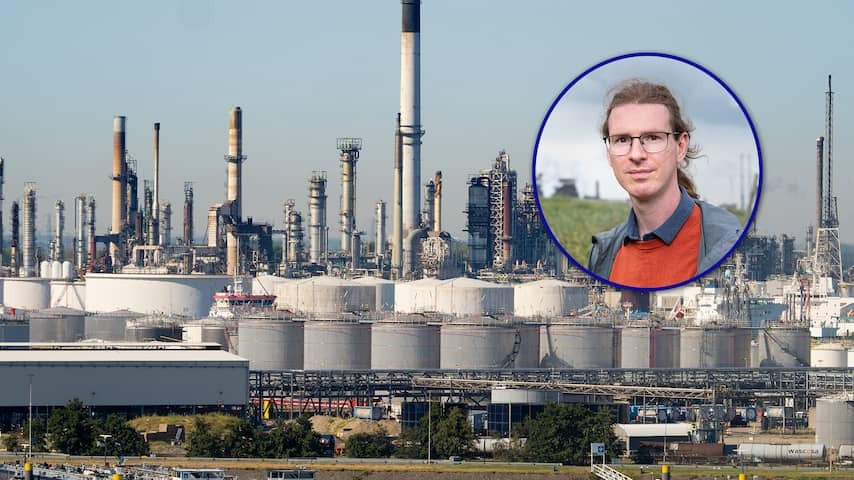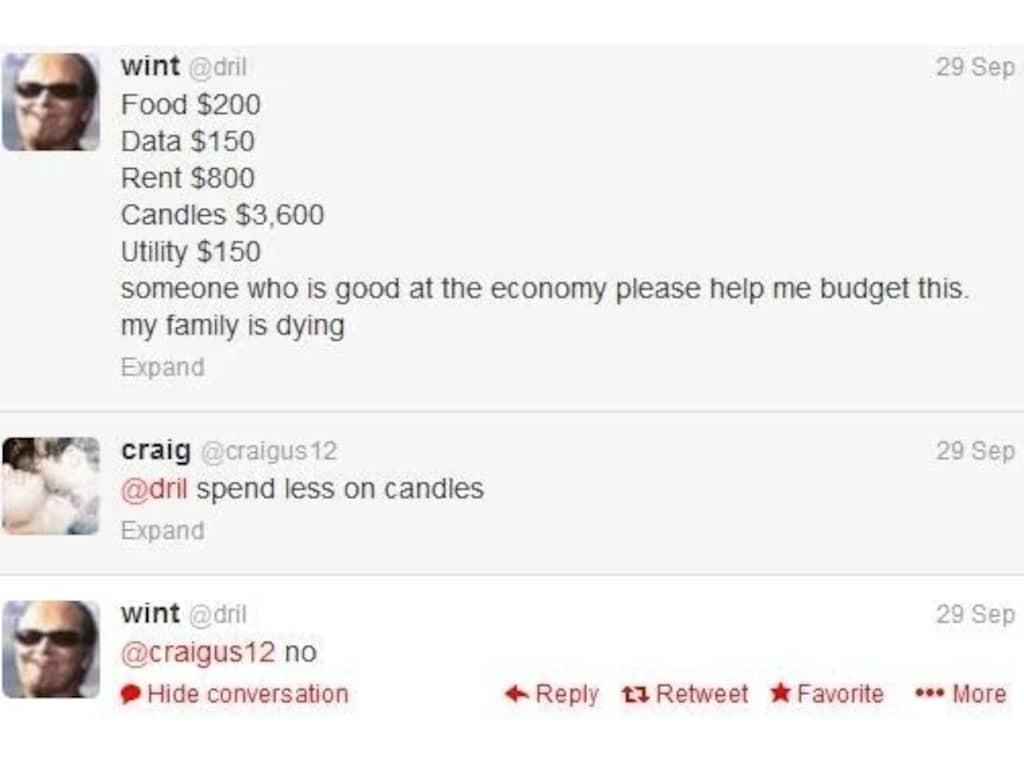
In the De Broeikas section, climate reporter Jeroen Kraan writes every week about what strikes him. This week: Abolishing the CO2 levy does not solve the real problem of the industry. That is the high gas price.
If you are chronic online, like me, you may know this tweet from the old box:
Sometimes I have to think about this when the industry complains about the high environmental costs, but the price of natural gas itself seems to have forgotten. It is like the above twitterer who is looking for a lower rent, but does not want to skimp on candles.
Gas is two to three times more expensive in the Netherlands than before the energy crisis. And the prices remain unpredictable. If Iran decides to close the Strait van Hormuz, as it seemed as possible earlier this month, the prices can suddenly rise again. A large amount of liquid natural gas can then no longer come our way. Quite a problem if you need 10 billion cubic meters a year, such as our industry.
CO2 levy is small beer
The environmental taxes that companies pay fall at the gas price. Under the European CO2 trade, companies now have to pay around 70 euros per tonne of CO2 emissions. That is more than 12 cents per cubic meters of gas. But by far the most industry emissions are still exempt from this levy, so in reality companies pay much less.
The Dutch CO2 levy has not generated any income for the government at all, because it only applies if the European CO2 price is relatively low. Moreover, the levy only applies to a small part of the emissions of a company.
Because the levy is steadily up, the government did expect income in the coming years. Industrial companies would pay around 125 million euros in 2028, was expected. Not nothing, but it comes down to only 3.50 euros per tonne of industrial emissions. This is 0.62 cents per cubic meters of gas.
Stick behind the door, carrots in abundance
The abolition of the levy, as a right -wing majority of the House of Representatives wants, changes very little in the short term for industry (and for the climate). In the longer term, a stick will disappear, as outgoing climate minister Sophie Hermans calls the levy. That is the threat of a tax that does start to hurt if companies do not make it more sustainable quickly enough.
While that stick disappears behind the door, the government continues to hand out roots eagerly. The Netherlands spends billions on sustainability subsidies and tax discounts for the industry, professor Herman Vollebergh (University of Tilburg) wrote this week in economists’ trade magazine ESB . “The industry is actually being kept out of the wind in climate policy.”
He finds the CO2 levy a good addition to the European CO2 trade. Other economists do not: they fear that such a national measure will eventually lead to ‘leaking away’ from industrial activity and CO2 emissions to other countries, with which the climate does not get along.
Real problem not solved
Even if that is correct, the abolition of the CO2 levy does not solve the real problem of the industry. That is the gas price, which is three times as high here as in the United States. That gas price also works in our electricity price. Even if we abolish all our environmental taxes, it continues to pay for polluting companies to move their factories to the US. At least if they are willing to defy the political grilling of the Trump government.
The solution to the problems that cause high gas prices in industry (and on the energy bill of households) is therefore clear: switching to sustainable energy from home soil as quickly as possible. That process must precisely boost all those climate taxes and subsidies.
And yes, that transition to a sustainable economy will also hurt. “There will be losers,” says Vollebergh. “And those are probably the most polluting companies. Exactly the companies on which the CO2 levy is aimed.”
In The Section The Greenhouse , Climate Reporter Jeroen Kraan Writes Weekly about what he notices. This week: Abolishing the CO2 Levy Does Not Solve the Real Problem of the Industry. That is the high gas price.
If you are chronically online, Like Me, You May Know This Old Tweet:

Sometimes I have to think about this when the industry complains again the high -environmental costs, but the price of natural gas items to have to have leg forgotten. It’s like the tweeter above looking for lower runs but not wanting to skim on candles.
Gas is Two to Three Times More Exensive in the Netherlands than Before the Energy Crisis. And Prices Remain Unpredictable. If Iran decides to close the strait of hormuz, as seemed Possible Earlier This Month, Prices Could Suddenly Shoot Up Again. A Significant Amount of Liquefied Natural Gas Can Then No Longer Come Our Way. QUITE A PROBLEM IF YOU NEED 10 BILLION CUBIC Meters per year, Like Our Industry.
CO2 Levy is Small Beer
The Environmental Taxes That Companies Pay Pale in Comparison to the Gas Price. Under the European CO2 Trading System, Companies Now Have To Pay Approximately 70 euros per ton of CO2 Emissions. That is more than 12 cents per cubic meter or gas. But by Far Most of the Industry’s Emissions Are Still Exempt from this Levy, So in reality companies Pay Much Less.
The Dutch CO2 Levy has so far not generated any income for the government, because it only applies if the European CO2 Price is relatively low. MoreOover, The Levy Only Applies to a Small Part of A Company’s Emissions.
Because the Levy is Steadily Increasing, The Government Did Expect Income in the Coming Years. Industrial Companies Were Expected to Pay Approximately 125 Million Euros in 2028. Not Nothing, But It Amounts to Only 3.50 euros per Ton or Industrial Emissions. Converted, that is 0.62 cents per cubic meter or gas.
Stick behind the by gone, roots in abundance
Abolishing the Levy, As a Right-Wing Majority in the House of Representatives Wants, Will Therefore Change Very Little For The Industry (and for the Climate) in the Short Term. In The Longer Term, A Stick Behind the by Disappears, As Outgoing Climate Minister Sophie Hermans Calls The Levy. That is the threat of a tax that will start to hurt if companies do not Become More Sustainable Quickly Enough.
While that stick behind the by disappears, The Government Continues to Eagly Hand Out Carrots. The Netherlands Spends Billions on Sustainability Subsidies and Tax Breaks For Industry, Professor Herman Vollebergh (Tilburg University) Wrote This Week in Economics Journal ESB . “In reality, the industry, Being is significant lively shielded from the wind in Climate Policy.”
He believes the CO2 Levy is a good addition to the European CO2 Trading System. Other Economists Disagree: they fear that such a national Measure will possibly lead to ‘leakage’ of industrial activity and co2 emissions to other country, which does not help the climate.
Real problem not solved
Even that is correct, abolishing the CO2 Levy Does not solve the real problem of the industry. That is the gas price, which is Three Times as High Here as in the United States. That gas price also affects our electricity price. Even if we abolish all our environmental taxes, it will still pay for polluting companies to move their factories to the us. If they are willing to brave the political whims of the trump administration.
The Solution to the Problems That High Gas Prices Cause in Industry (and on Household Energy Bills) is Therefore Clear: Switch to Sustainable Energy from Our Own Soil as Quickly As Possible. All Those Climate Taxes and Subsidies Should be Encouraging That Process.
And yes, that transition to a sustainable economy will also hurt. “There will be losers,” Says Vollebergh. “And those are probably the most polluting companies. Precisely the companies on which the CO2 Levy is targeted.”